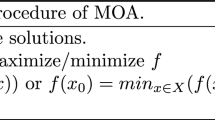Abstract
A recently developed model of general collective intelligence defines a method for organizing humans or artificially intelligent agents that is believed to create the potential to exponentially increase the general problem-solving ability of groups of such entities over that of any individual entity. An analysis based on this model suggests that many and perhaps all “wicked problems” are collective optimization problems that cannot reliably be addressed without a system of collective optimization, but that might be reliably addressed through such a system. This paper briefly introduces the concept of GCI as well as why it is a system of collective optimization, and explores why “wicked problems” from the perspective of GCI are collective optimization problems, and therefore why such problems might require GCI to be reliably solvable.
Similar content being viewed by others
References
Agre PE (1995) Computational research on interaction and agency. Artif Intell 72(1–2):1–52
Davis E, Marcus G (2015) Commonsense reasoning and commonsense knowledge in artificial intelligence. Commun ACM 58(9):92–103
Dreyfus HL (2018) Misrepresenting human intelligence. Artificial intelligence. Routledge, pp 41–54
Kirsh D (1991) Foundations of AI: the big issues. Artif Intell 47(1–3):3–30
Last C (2020) Global brain: foundations of a distributed singularity. In: Korotayev A, LePoire D (eds) The 21st century singularity and global futures. World-systems evolution and global futures. Springer, Cham. https://doi.org/10.1007/978-3-030-33730-8_16
Malone TW (2018) Superminds: the surprising power of people and computers thinking together. Little, Brown Spark
Peeters MMM, van Diggelen J, van den Bosch K et al (2020) Hybrid collective intelligence in a human–AI society. AI Soc. https://doi.org/10.1007/s00146-020-01005-y
Putnam H (1992) Why functionalism didn’t work. Inference, explanation, and other frustrations: essays in the philosophy of science, vol 14. p 255
Wachowski WM (2018) Commentary: distributed cognition and distributed morality: agency, artifacts and systems. Front Psychol 9:490
Williams AE (2019) The relationship between collective intelligence and one model of general collective intelligence. In: Nguyen N, Chbeir R, Exposito E, Aniorté P, Trawiński B (eds) Computational collective intelligence. ICCCI 2019. Lecture notes in computer science, vol 11683. Springer, Cham. https://doi.org/10.1007/978-3-030-28377-3_49
Williams AE (2020a) A model for artificial general intelligence. In: Goertzel B, Panov A, Potapov A, Yampolskiy R (eds) Artificial general intelligence. AGI 2020. Lecture notes in computer science, vol 12177. Springer, Cham. https://doi.org/10.1007/978-3-030-52152-3_38
Williams AE (2020b) Human intelligence and general collective intelligence as phase changes in animal intelligence. https://doi.org/10.31234/osf.io/dr8qn
Williams AE (2020c) The collective intelligence based program to accelerate achievement of the sustainable development goals as a case study for Collectively Intelligent Program Design. https://doi.org/10.31235/osf.io/r2dxq
Williams AE (2021a) General problem-solving ability in natural systems as a model for computation. https://doi.org/10.31730/osf.io/5x3g7
Williams AE (2021b) Defining a continuum from individual, to swarm, to collective intelligence, to general collective intelligence. (in print)
Winograd T (2006) Shifting viewpoints: artificial intelligence and human–computer interaction. Artif Intell 170(18):1256–1258
Woolley AW, Chabris CF, Pentland A, Hashmi N, Malone TW (2010) Evidence for a collective intelligence factor in the performance of human groups. Science 330(6004):686–688. https://doi.org/10.1126/science.1193147 (Bibcode:2010Sci...330..686W)
Author information
Authors and Affiliations
Corresponding author
Additional information
Publisher's Note
Springer Nature remains neutral with regard to jurisdictional claims in published maps and institutional affiliations.
Rights and permissions
About this article
Cite this article
Williams, A.E. Are wicked problems a lack of general collective intelligence?. AI & Soc 38, 343–348 (2023). https://doi.org/10.1007/s00146-021-01297-8
Received:
Accepted:
Published:
Issue Date:
DOI: https://doi.org/10.1007/s00146-021-01297-8




